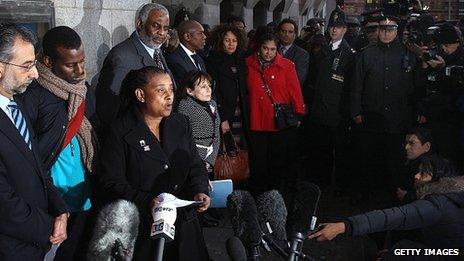Stephen Lawrence: Reporting the trial on Twitter
- Published

During the seven-week trial, Philippa Thomas said she learned to juggle her red notebook with a smartphone so she could post 140 character tweets
Using Twitter transformed my reporting as a member of the BBC team covering the Stephen Lawrence murder trial. It has its pitfalls. But I believe it has great potential.
I first reported from the Old Bailey in 2003, covering Ian Huntley's trial for the murder of Holly Wells and Jessica Chapman.
The tools of the trade were an A4 notebook and a stack of pens. I transcribed hours of evidence at a time. To report, I left court.
That routine is still the basis of British legal reporting.
It means that you, the audience, rely entirely on us, the journalists, to decide what's most important about the day's proceedings. It seems a little strange to me after living for years in the US, where cameras in court are the norm.
But even without "Court TV", I believe our legal reporting has reached another tipping point - because of the use of Twitter.
Juggling act
During the seven-week Stephen Lawrence trial, I wrote pages of notes and quotes as always in the red notebook balanced on my lap. But I learned to juggle the book with a smartphone, simultaneously texting updates to the BBC newsroom and posting 140 character tweets online.
It is challenging. You don't want to miss the thread of an argument, those moments where you really have to stop writing and listen hard.
You do want to quote a witness exactly, not in half-remembered paraphrase.
You don't want to get into online conversations about the merits of the case. I was asked on Twitter - while sitting a few feet from Stephen's parents - how well I thought the prosecution was doing, how strong the scientific evidence looked, and whether a guilty verdict was likely. All matters for the jury, not me.
But I learned, from reactions to my tweets, about levels of interest and on occasion levels of ignorance, showing what needed to be better explained.
Verdict day
Then came Tuesday. The news of the jury's return changed everything.
At 14:30 GMT, I sent out my last tweet before running out of the building - "#stephenlawrence jury coming in - could verdict be imminent? - watch #BBCNewschannel".
As I went live to deliver that breaking news to BBC viewers, Twitter went from tool to source.
I was no longer an eyewitness to this landmark legal case. I was no longer able to post tweets. I was standing in the street talking to the camera - for a stretch of almost three hours on the day of the verdict, and nearly two hours as the sentences were handed down.
The broadcasts were only made possible by a chain of BBC producers inside the court and on the street - and for us, on the day the sentences were announced, an unprecedented reliance on Twitter.
Standing on the pavement, producer Liz Shaw started by feeding me text messages from our legal brain Jeremy Britton inside the courtroom.
She wrote them out with marker pen on a big white board: "Sentencing imminent". "Dobson told to stand". "Dobson - 15 years and 2 months". And so on.
Standing right next to cameraman Roy Gillett, producer Sally Graham was monitoring the Twitter feed on her own smartphone. We'd agreed she would pass me facts, quotes and "colour" from our most reliable sources on the inside - above all, BBC correspondents Matt Prodger and Dominic Casciani.
As I talked to screen, Sally's hand would come into view - phone received, tweet delivered, phone back - and she'd start scanning for the next bite of information.
All around us, every spare inch of pavement was crammed with onlookers.
Police officers came to listen. Waiting guests - a judge, a politician, a professor - had to battle for space with the crowd. Even the London skies added a bit of drama, with gusts of wind and squalls of rain.
As I talked, it was up to me to draw on my two months' experience of the courtroom and the case. I did my best to decipher the short bursts of information from Twitter and text, and to shape the story for our audience.
But it was BBC teamwork that provided that never-ending flow of dramatic detail, bringing our viewers as close as we could to the experience of being there in Court 16.